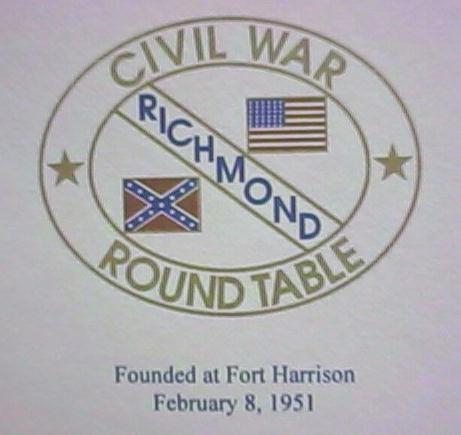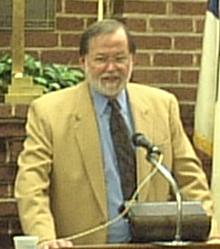


March 2004
rcwrt.org
First Vice President: Rob Monroe, Editor Richard Forrester 2416 Edenbrook Dr. Second Vice President: Richmond, VA 23228-3040 Shep Parsons rmonroe@richmond.com
March 2004 PROGRAM Gary W. Gallagher, "Has Enough Been Written About Gettysburg?" 8:00 p.m., Tuesday, March 9, 2004, at the Boulevard United Methodist Church, 321 N. Boulevard, Richmond, VA (corner of Boulevard and Stuart Ave.) Enter the basement door on the right side under the front steps. Gary W. Gallagher is the John L. Nau III Professor in the History of the American Civil War at the University of Virginia. Prior to joining the faculty at U.Va., he taught for 12 years at Penn State University. A native of Los Angeles, he received his B.A. from Adams State College of Colorado and his M.A. and Ph.D. from the University of Texas at Austin. Active in the field of historic preservation, Gallagher was president of the Association for the Preservation of Civil War Sites from 1987 to 1994. He also served as a member of the board of the Civil War Trust and has given testimony about preservation before Congressional committees on several occasions. He has published over 100 articles and notes in magazines and journals, has appeared regularly on A&E's series "Civil War Journal" and participates in other television projects on the subject. Professor Gallagher has received numerous awards including the 1990 Douglas Southall Freeman History Award for the best work in southern history. He is the author of "Stephen Dodson Ramseur: Lee's Gallant General," "The Confederate War," "Lee and His Generals in War and Memory," "The American Civil War: The War in the East 1861-May 1863" and "Lee and His Army in Confederate History." Most recently he was editor and co-author of "The Shenandoah Valley Campaign of 1862" and has served in that capacity for numerous books including "The First Day at Gettysburg: Essays on Confederate and Union Leadership," "The Second Day at Gettysburg: Essays on Confederate and Union Leadership" and "The Third Day at Gettysburg and Beyond." He will address the Round Table on the topic "Has Enough Been Written About Gettysburg?"
Review of the February Program
 |
Field Trip is a Success
Beautiful weather greeted the 22 Round Table members who attended the sold out field trip of Dahlgren's Raid. The tour took place on Saturday, February 28 and was led by Hobbie Godden, Southworth Wallace and Dick Forrester. Members traveled through Goochland and Henrico counties following the route taken by Col. Ulric Dahlgren in his attempt to reach Libbie Prison in Richmond. The tour was just two days shy of the 140th anniversary of the unsuccessful raid.
New SUV Camp Recruiting Members
A new Sons of Union Veterans of the Civil War camp is now actively recruiting members. The Col. James D. Brady Camp 63 will have a belt of influence that extends from Richmond to Fort Monroe. A Virginia native who moved north before the war, Brady served in the 63rd New York Regiment, the Irish Brigade. When the war had ended, Brady returned to the Commonwealth where he got married and eventually became a Congressman. He took a conciliatory approach in politics and worked to bind the nation's wounds. The RCWRT's own Neil Hanlon will serve as commander. He extends a welcome to all Round Table members who have ancestors who fought for the Union. The heritage organization plans to meet every month or every other month in either Petersburg or Williamsburg. The group will discuss books, contribute to battlefield preservation, serve as an outlet for reenactors and become involved in memorial services, often to compliment the Sons of Confederate Veterans. For more information, call Bill Rose at 804-931-6335 or Neil Hanlon at 800-739-6464.
Lectures Highlight March Events
Wednesday, March 17 Dr. Mark Grimsley, "Union Military Policy Toward Southern Civilians." Library of Virginia Lecture Hall, 5:30 pm. $5 or free to Museum of the Confederacy members and Library of Virginia donors. Reservations required, 804-649-1861 ext. 10.
Thursday, March 18 Dr. Daniel Sutherland, "Terrorism and Counter-Terrorism in the Civil War." University of Richmond, Jepson Hall room 118, 7:30 pm.
Wednesday, March 24 Dr. Mark E. Neely, Jr., "The Fate of Civil Liberties in the Confederacy and the Union." Library of Virginia Lecture Hall, 5:30 pm. $5 or free to Museum of the Confederacy members and Library of Virginia donors. Reservations required, 804-649-1861 ext. 10.
Thursday, March 25 Dr. Daniel Sutherland, "Coping with War in Culpeper, Virginia." University of Richmond, Jepson Hall room 118, 7:30 pm.
Wednesday, March 31 Mauriel Joslyn and Dr. James M. Gillispie, "The Treatment of Prisoners." Library of Virginia Lecture Hall, 5:30 pm. $5 or free to Museum of the Confederacy members and Library of Virginia donors. Reservations required, 804-649-1861 ext. 10.
"Celebrate South" Activities Focus on Georgia The Museum ot the Confederacy's annual "Celebrate South" weekend will honor the state of Georgia with a variety of events next month:
Friday, April 2 11:30 am-1:30 pm, "The People Back Home," living history of people touched by war. $30, lunch included. 2300 Club, 23rd and E. Grace streets. 7 pm-10 pm, "Homecoming Gala & Silent/Live Auction," over 150 items up for bid. $35, music and Southern cooking included. Museum of the Confederacy.
Saturday, April 3 8 am-1 pm, "Battlefield Tour," a day-in-the-life of a soldier in the 1864 Overland Campaign. $30 includes transportation from Museum of the Confederacy to Spotsylvania Battlefield. 8:30 am-1:30 pm, "Historic Richmond Tour" visits local Confederate sites. $35. Leaves from Museum of the Confederacy. 7:30 pm-midnight, "The Grand Georgia Gala," black tie or period clothing. $200 reserved or $100 non-reserved. Tredegar Iron Works Gun Foundry Building.
Sunday, April 4 10 am-noon, "Farewell Brunch" featuring Southern breakfast favorites. $15. Museum of the Confederacy.
Tickets to all events are limited and reservations are required. Call the museum for more information, 804-649-1861 ext. 44.
RCWRT Monthly Speakers for 2004
Newsletter Deadlines To facilitate the printing and timely distribution of the monthly newsletter, information for it should be submitted to the editors no later than the following dates: April newsletter April 2 May newsletter April 30 June newsletter May 28 July newsletter July 2 August newsletter July 30 September newsletter September 3 October newsletter October 1 November newsletter October 29 December newsletter December 3 Information may be emailed to rmonroe@richmond.com
Richmond Civil War Round Table Newsletter Rob Monroe, Editor 2416 Edenbrook Dr. Richmond, VA 23228-3040
Return to News Letters Index
Return to main page

©R.C.W.R.T. 2004